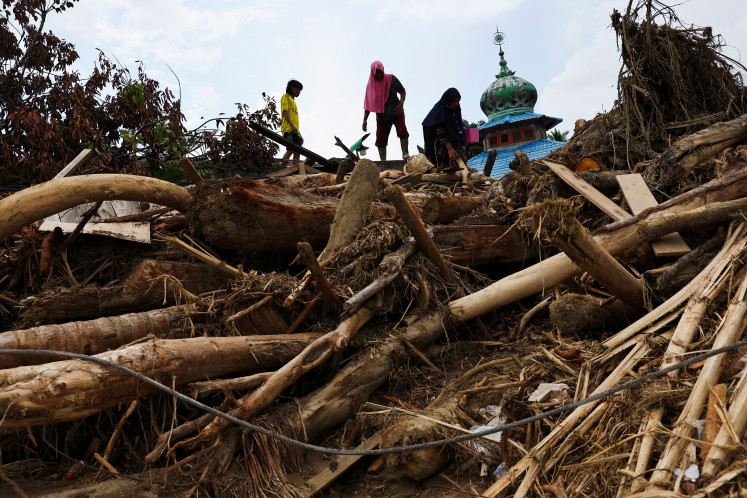Popular Reads
Top Results
Can't find what you're looking for?
View all search resultsPopular Reads
Top Results
Can't find what you're looking for?
View all search resultsWhole-of-ASEAN approach sought for Rohingya crisis
The Indonesian and Malaysian representatives at the ASEAN Intergovernmental Commission on Human Rights (AICHR) have called on member countries to take more practical steps to fulfil a commitment to bring peace in a conflict that has forced hundreds of thousands of Rohingya to flee Myanmar amid charges of “ethnic cleansing” and “genocide”
Change text size
Gift Premium Articles
to Anyone
T
he Indonesian and Malaysian representatives at the ASEAN Intergovernmental Commission on Human Rights (AICHR) have called on member countries to take more practical steps to fulfil a commitment to bring peace in a conflict that has forced hundreds of thousands of Rohingya to flee Myanmar amid charges of “ethnic cleansing” and “genocide”.
“While we still believe that ASEAN is best-placed to take pro-active measures in order to achieve durable solutions, it appears that we are failing to swiftly and fully utilize the collective resources of our ASEAN bodies in response to this humanitarian crisis,” Indonesian Dinna Wisnu and Malaysian Edmund Bon Tai Soon said in a joint statement on Monday. “Clearly this issue can no longer be addressed by one or a few member states, but ASEAN as a regional group must deal with the stark realities facing us. It must be a ‘whole-of-ASEAN-approach’ and no member state should be passing the buck.”
The statement was issued after Malaysian and Indonesian authorities intercepted several boats ferrying refugees, mostly women and children, from Rakhine state. The latest case occurred on Friday. The Associated Press reported that eight children, 25 women and 43 men were brought ashore at Bireuen, Aceh, in the third known attempt this month by members of the ethnic minority to flee Myanmar by sea.
Dinna said as there was dire need for ASEAN to take immediate action, all eyes were looking toward the ASEAN foreign ministers, especially in an ASEAN Summit meeting in Singapore that starts on Wednesday. In the last ASEAN Foreign Minister’s retreat in February, the crisis was only briefly mentioned by Vivian Balakrishnan, Singapore’s foreign minister. Balakrishnan expressed the ministers’ support for the Myanmar government to bring peace to Rakhine and “stressed the need to find a comprehensive and durable solution to address the root causes of the conflict”.
Dina said the crisis seems to have generated more international discussion and concern outside of ASEAN, but so far no other ASEAN bodies had talked about it. Even the AICHR, whose responsibility was to promote and protect human rights in ASEAN, had yet to reach a consensus, with only Indonesia and Malaysia having talked openly about it.
“Some representatives remained silent and can only to talk informally, while others are saying that it is not ASEAN’s business but Myanmar’s domestic problem,” she said without naming the countries. However, the United Nations General Assembly adopted a resolution in December last year for Myanmar to deal with the issue that was passed by a vote of 122 to 10 with 24 abstentions. China, Russia, Cambodia, Laos, the Philippines and Vietnam joined Myanmar in voting against the measure.
Health agencies say the conditions in camps in Bangladesh that house nearly 700,000 Rohingya are deteriorating.
“Those refugees are unlikely to remain there permanently; they will board vessels for other parts of ASEAN. This is not just a matter for Myanmar, it is now all of ASEAN’s problem,” Aaron Connelly of Sydney’s Lowy Institute for International Policy said.
“If ASEAN’s remaining leaders do not set aside their differences and take more decisive action, the events of 2016 to 2018 in Rakhine state will go down as one of the organization’s most shameful chapters, akin to the legacy of Kosovo in Europe or Rwanda in Africa,” he said. “We will all regret not doing more.”










